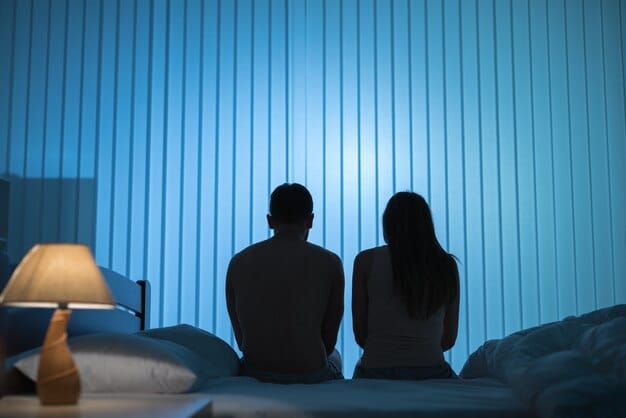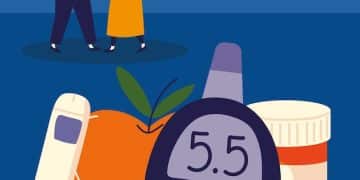Mental Health & Sexual Function: Addressing Anxiety and Depression

The intricate relationship between mental well-being and sexual function reveals that anxiety and depression often significantly impair libido, arousal, and overall sexual satisfaction, necessitating integrated approaches for effective treatment.
In the complex tapestry of human health, few threads are as intertwined yet often overlooked as the connection between mental well-being and physical intimacy. Specifically, the role of mental health in sexual function: addressing anxiety and depression is a critical dialogue that impacts countless lives, influencing not just physical responses but also emotional connection and overall life satisfaction. This exploration aims to demystify this intricate relationship, offering clarity and guidance.
Understanding the Interplay: Mental Health and Sexual Well-being
The connection between our minds and bodies is undeniable, and perhaps nowhere is this more evident than in the realm of sexual health. Mental states profoundly influence physiological processes, especially those related to intimacy.
When discussing sexual function, it’s not merely about physical capability but a holistic experience encompassing desire, arousal, and satisfaction. Each of these components can be significantly impacted by our mental state, creating a delicate balance that, when disrupted, can lead to distress and relationship strain.
The Brain as the Primary Sexual Organ
It’s often said that the brain is the most important sexual organ, and for good reason. It processes stimuli, interprets emotions, and orchestrates the complex cascade of hormones and neurological signals that underpin sexual desire and arousal. When mental health challenges like anxiety or depression are present, this intricate machinery can falter.
- Neurotransmitter Imbalance: Depression often involves disruptions in neurotransmitters like serotonin and dopamine, which are crucial for mood regulation but also play key roles in sexual desire and pleasure.
- Cognitive Distortions: Anxiety can lead to overthinking, self-consciousness, and performance pressure, diverting mental energy away from pleasure and intimacy.
- Stress Response: Chronic stress, often a companion to anxiety and depression, floods the body with cortisol, which can suppress sex hormones and reduce libido.
Acknowledging the brain’s central role is the first step toward understanding why mental health interventions are so crucial in addressing sexual dysfunctions. It underscores the notion that sexual health is not just a physiological concern but deeply rooted in psychological well-being.
The insidious nature of persistent anxiety or chronic depression can erode self-esteem and body image, which are fundamental to a healthy sexual life. Individuals may withdraw, avoid intimacy, or experience a significant drop in desire, further compounding their emotional distress. This cycle highlights the necessity of a compassionate and integrated approach to care.
Anxiety’s Grip: Performance Pressure and Sexual Avoidance
Anxiety, in its myriad forms, exerts a significant and often debilitating influence on sexual function. It taps into primal defense mechanisms, diverting resources away from activities perceived as non-essential for immediate survival—which, unfortunately, includes intimacy.
From generalized anxiety disorder to specific phobias and social anxiety, the common thread is an overwhelming sense of worry, fear, or apprehension. When this anxiety infiltrates the bedroom, it can transform what should be a spontaneous and pleasurable experience into a source of immense stress.
Performance Anxiety: A Common Culprit
One of the most prevalent manifestations of anxiety in a sexual context is performance anxiety. This isn’t limited to specific genders; individuals of all identities can experience intense fear about their ability to perform adequately or satisfy their partner.
- Erectile Dysfunction: For men, performance anxiety is a leading cause of psychological erectile dysfunction, where the fear of not achieving or maintaining an erection becomes a self-fulfilling prophecy.
- Anorgasmia and Arousal Difficulties: For women, anxiety can inhibit arousal and make achieving orgasm challenging or impossible, leading to frustration and self-blame.
- Premature Ejaculation: The heightened sympathetic nervous system activity associated with anxiety can contribute to premature ejaculation, further fueling performance concerns.
This anxiety creates a feedback loop: fear of failure leads to actual difficulties, which then intensify the fear for future encounters. The focus shifts from connection and pleasure to self-monitoring and catastrophic thinking.
Beyond performance, anxiety can manifest as an avoidance of sexual situations altogether. The anticipation of failure or discomfort can lead individuals to preemptively withdraw, creating distance in relationships and further isolating themselves from positive intimate experiences. This avoidance only reinforces the belief that sex is a source of anxiety rather than pleasure.
Depression’s Shadow: Low Libido and Anhedonia
Depression casts a long shadow over every aspect of life, and sexual function is certainly not immune. Distinct from anxiety’s frenetic energy, depression’s impact often presents as a profound lack of interest, energy, and pleasure—a state known as anhedonia.
The very definition of clinical depression includes a loss of interest or pleasure in activities once enjoyed, and this powerfully extends to sexual activity. It’s not just a matter of “not being in the mood”; it’s a deeper, neurological disengagement from the mechanisms of desire and reward.
Impact on Desire and Arousal
One of the most widely reported sexual side effects of depression is significantly reduced libido, or sex drive. This is often accompanied by anhedonia, meaning the inability to experience pleasure, including sexual pleasure.

- Reduced Energy Levels: Depression saps physical and mental energy, making the thought of engaging in sexual activity feel overwhelming or exhausting.
- Body Image Issues: Many individuals with depression experience negative self-perception, leading to feelings of unattractiveness or unworthiness, which can further dampen desire.
- Interpersonal Strain: The withdrawal and irritability often associated with depression can strain relationships, making intimate connection more difficult and less appealing.
Furthermore, the medications used to treat depression, particularly selective serotonin reuptake inhibitors (SSRIs), are well-known for their sexual side effects, including decreased libido, difficulty with arousal, and anorgasmia. This complicates the picture, as individuals seeking help for their mental health may inadvertently face new sexual challenges.
The anhedonia experienced in depression means that even if one initiates sexual activity, the capacity to derive pleasure from it may be severely diminished. This lack of reward reinforces the disinterest, perpetuating a difficult cycle that requires careful navigation and understanding from both individuals and their partners.
The Bidirectional Relationship: Mental Health Affecting, and Affected by, Sexual Function
It’s crucial to recognize that the relationship between mental health and sexual function is not a one-way street. While anxiety and depression can significantly impair sexual health, difficulties in sexual function can, in turn, exacerbate or even trigger mental health issues.
This bidirectional nature means that addressing one aspect often requires considering the other. For instance, chronic sexual dysfunction can lead to feelings of frustration, inadequacy, and sadness, which can spiral into depressive symptoms or heighten existing anxiety.
The Cycle of Distress
Consider a scenario where an individual experiences performance anxiety that leads to recurrent difficulties with sexual function. This can lead to:
- Decreased Self-Esteem: Feelings of inadequacy or shame over one’s sexual capabilities.
- Relationship Strain: Misunderstandings, resentment, and reduced intimacy with a partner.
- Social Withdrawal: Avoidance of intimate situations or even social interactions altogether due to embarrassment.
- New or Worsened Mental Health Symptoms: The emotional toll can lead to the onset of depression, increased anxiety, or a worsening of pre-existing conditions.
Conversely, improvement in sexual function, perhaps through effective treatment for anxiety or depression, can significantly boost self-confidence, improve relationship quality, and contribute to an overall sense of well-being, thus supporting positive mental health outcomes. This demonstrates the circular influence where improvements in one area can catalyze positive change in the other.
The interplay highlights the need for a holistic approach to patient care, where both mental and sexual health are assessed and addressed in an integrated manner. Ignoring one aspect can severely hinder progress in the other, underscoring the interconnectedness of human health.
Integrated Approaches: Therapy, Medication, and Lifestyle
Given the complex interplay between mental health and sexual function, a multifaceted approach is often the most effective. No single solution fits all, and treatment plans should be tailored to individual needs, often combining various therapeutic modalities, medication management, and lifestyle adjustments.
Working with healthcare professionals who understand this intricate relationship is paramount. This can include primary care physicians, psychiatrists, therapists specializing in sex therapy, and relationship counselors.
Therapeutic Interventions
Therapy plays a crucial role in untangling the psychological knots that often contribute to sexual dysfunction.
- Cognitive Behavioral Therapy (CBT): Helps identify and challenge negative thought patterns and behaviors contributing to anxiety or depression, including those related to sex. It can teach coping mechanisms for performance anxiety.
- Sex Therapy: Specialized counseling focusing directly on sexual issues, addressing communication, desires, arousal, and specific dysfunctions. Sex therapists often use a combination of educational and behavioral techniques.
- Couples Therapy: When sexual issues affect a relationship, couples therapy can improve communication, empathy, and joint problem-solving, fostering an environment conducive to intimacy.
These therapies aim not just at symptomatic relief but at addressing the underlying psychological factors, fostering healthier attitudes toward sex, and rebuilding confidence.
Medication Management
Medication can be an essential component, particularly for managing severe anxiety or depression. However, given the sexual side effects of some antidepressants (especially SSRIs), careful consideration and collaboration with a prescribing physician are necessary.

- Adjusting Dosages or Medications: Sometimes, a lower dose or a switch to a different antidepressant with fewer sexual side effects (e.g., bupropion) can alleviate issues.
- Add-on Medications: In some cases, specific medications (e.g., sildenafil, tadalafil) might be prescribed to address physical aspects of sexual dysfunction while mental health is also being treated.
- Hormone Therapy: For some, particularly those with depression affecting hormone balance, assessing and correcting hormonal deficiencies might be part of the treatment.
It’s crucial for patients to openly discuss sexual side effects with their doctors rather than discontinuing medication on their own, as this can lead to a relapse in mental health symptoms. Open communication allows for adjustments and alternative strategies.
Lifestyle Adjustments
Supportive lifestyle changes can significantly enhance both mental and sexual well-being, acting as complementary approaches to formal treatment.
- Regular Exercise: Boosts mood, reduces stress, and improves body image and blood flow.
- Balanced Diet: Supports overall physical health and energy levels.
- Mindfulness and Stress Reduction: Practices like meditation or yoga can reduce anxiety and improve present moment awareness, enhancing intimacy.
- Adequate Sleep: Crucial for hormone regulation, mood, and energy.
- Limiting Alcohol and Drugs: Substances can acutely impair sexual function and worsen mental health over time.
These personal habits, while seemingly simple, lay a strong foundation for both mental resilience and a healthy sexual life. They empower individuals to take an active role in their recovery and well-being.
The process of regaining healthy sexual function when impacted by mental health challenges is often a journey, not a sprint. Patience, self-compassion, and consistent effort, combined with professional guidance, are key to navigating this path successfully.
Communication and Support: Strengthening Relationships
One of the most powerful tools in navigating the intersection of mental health and sexual function is open and honest communication, particularly with a partner. When sexual difficulties arise due to anxiety or depression, a sense of shame or fear often leads to silence, which can create emotional distance and exacerbate problems.
Cultivating an environment of empathy, understanding, and mutual support within a relationship is vital. This means moving beyond assumptions and engaging in vulnerable conversations about feelings, challenges, and desires.
Fostering Open Dialogue
For individuals experiencing mental health-related sexual difficulties, initiating these conversations can be daunting. However, partners often respond with more understanding and support than anticipated when they are given the opportunity to understand the underlying issues.
- Choose the Right Time and Place: A calm, non-confrontational setting away from the bedroom is ideal for discussing sensitive topics.
- Use “I” Statements: Focus on personal feelings (“I feel anxious about…”) rather than accusatory language (“You don’t understand…”).
- Educate Your Partner: Share information about how anxiety or depression impacts sexual function, helping your partner understand that it’s not a personal reflection on their attractiveness or your feelings for them.
For partners, it’s equally important to listen without judgment, validate their partner’s feelings, and express reassurance. Understanding that mental health conditions are illnesses, not choices, can foster immense compassion.
Shared activities beyond the sexual realm can also strengthen bonds and reduce pressure. Focusing on shared interests, quality time, and affection that isn’t necessarily sexual can rebuild intimacy and connectedness, creating a foundation for sexual rediscovery once mental health improves.
When communication challenges persist, involving a couples therapist or sex therapist can provide a neutral space and professional guidance for navigating these delicate conversations. These professionals can equip both partners with effective communication strategies and help them develop shared understandings and expectations.
When to Seek Professional Help
Recognizing when to seek professional help is a critical step in addressing the interplay between mental health and sexual function. While self-help strategies and partner communication are valuable, there are clear indicators that professional intervention is warranted.
The goal of professional help is not only to treat symptoms but also to provide tools and strategies for long-term well-being and a fulfilling sex life.
Signs It’s Time for Professional Support
- Persistent or Worsening Symptoms: If anxiety or depression significantly impacts daily life, including your sexual function, for an extended period (e.g., several weeks or months), it’s time to consult a professional.
- Significant Distress: When sexual difficulties cause profound distress, shame, guilt, or impact self-esteem, professional guidance can provide relief and coping mechanisms.
- Relationship Conflict: If sexual issues are causing persistent arguments, emotional distance, or unhappiness in a relationship, a therapist specializing in couples or sex therapy can mediate and guide.
- Lack of Improvement with Self-Help: If you’ve tried self-help strategies (e.g., lifestyle changes, mindfulness) without significant improvement, the underlying issues may require a more structured therapeutic or medical approach.
- Concerns about Medication Side Effects: If you believe your medication is causing sexual side effects, it’s crucial to discuss this with your prescribing doctor rather than stopping medication on your own.
- Uncertainty about the Cause: A healthcare professional can help differentiate between psychological, physiological, or medication-related causes of sexual dysfunction.
It is important to remember that seeking help is a sign of strength, not weakness. Mental health challenges and sexual dysfunctions are common and treatable conditions. Early intervention can prevent minor issues from escalating into more complex problems.
The initial step might be a consultation with a primary care physician, who can provide a preliminary assessment, rule out physical causes, and offer referrals to specialists such as psychiatrists, psychologists, or sex therapists. Building a trusted team of healthcare providers who collaborate on your care ensures a holistic and effective treatment plan.
| Key Point | Brief Description |
|---|---|
| 🧠 Mind-Body Link | Mental health profoundly shapes sexual desire, arousal, and satisfaction. |
| 😟 Anxiety’s Impact | Leads to performance pressure, arousal difficulties, and sexual avoidance. |
| 😥 Depression’s Effect | Causes low libido, anhedonia (lack of pleasure), and reduced energy. |
| 🤝 Integrated Help | Requires therapy, medication management, and lifestyle changes for best results. |
Frequently Asked Questions
Yes, anxiety, particularly performance anxiety, is a very common psychological cause of erectile dysfunction. The stress and fear associated with performance can inhibit the physiological responses necessary for an erection, creating a self-fulfilling prophecy. Addressing the underlying anxiety through therapy or stress management techniques can often resolve the issue without medication, highlighting the powerful mind-body connection.
Many antidepressants, especially SSRIs, can have sexual side effects such as decreased libido, difficulty achieving arousal, and anorgasmia (difficulty reaching orgasm). This is due to their impact on neurotransmitters like serotonin. It’s crucial to discuss these side effects with your doctor, as adjustments to dosage, switching medications, or adding supplementary treatments can often alleviate these issues without compromising mental health.
Absolutely. As mental health improves, symptoms of anxiety and depression often subside, leading to increased energy, better mood, improved self-esteem, and a greater capacity for pleasure and connection. This positive shift can naturally enhance sexual desire, arousal, and overall sexual satisfaction. Addressing the root mental health issues is a fundamental step toward restoring a healthy and fulfilling intimate life.
Anhedonia is the inability to experience pleasure, a common symptom of depression. In sexual function, anhedonia means that even if a person engages in sexual activity, they may feel little to no pleasure or satisfaction from it. This lack of reward can lead to decreased motivation for sex and further contribute to a reduced libido, making intimacy feel like a chore rather than a source of joy.
You should seek professional help if mental health symptoms or sexual dysfunction are causing significant distress, impacting your relationships, or affecting your overall quality of life. This includes persistent low libido, difficulty with arousal or orgasm, or performance anxiety. Consulting a general practitioner, psychiatrist, sex therapist, or couples counselor can provide tailored guidance and treatment options to address these interconnected challenges effectively.
Conclusion
The journey to understanding and addressing the delicate connection between mental health and sexual function is one of profound importance. As we’ve explored, anxiety and depression are not merely mood disorders; they are powerful forces that can significantly disrupt the intricate dance of desire, arousal, and satisfaction. Recognizing that our minds are the primary architects of our intimate experiences is the first step toward effective resolution. Whether through integrated therapeutic approaches, thoughtful medication management, or supportive lifestyle adjustments, restoring balance to one’s mental landscape invariably ripples into a more fulfilling sexual life. The conversation around these intertwined aspects of health must continue to evolve, promoting open dialogue, compassionate understanding, and comprehensive care. Ultimately, a healthy mind paves the way for a healthy body and, indeed, a healthy and vibrant sexual self.





